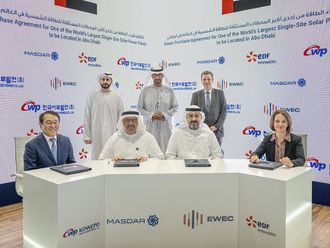Dubai: Dubai is pressing ahead with its plans to develop the energy sector in line with the clean energy strategy launched by His Highness Shaikh Mohammad Bin Rashid Al Maktoum, Vice-President and Prime Minister of the UAE and Ruler of Dubai, a top official said.
Saeed Mohammad Al Tayer, Managing Director and CEO of the Dubai Electricity and Water Authority, underlined the major role played by the Supreme Council of Energy in establishing Dubai as a global model of clean energy and green economy and saving energy by 30 per cent by 2030.
“Dubai has been following a long-term strategy that aims to save energy as well as to diversify sources of energy, driven by the Dubai clean energy stagey 20150, which was launched by Shaikh Mohammad during the UAE Innovation Week in 2015. The strategy aims to transform Dubai into a global centre of clean energy and green economy, “Al Tayer said.
He added that the energy strategy would shape the energy sector in Dubai over the next three decades. It aims to provide 75 per cent of the emirate’s energy through clean energy sources by 2050, reflecting Dubai’s commitment to establish a sustainable model in energy conservation, support economic growth without damaging the environment and natural resources.
“Our goal is to make Dubai a city with the smallest carbon footprint in the world by 2050,” Al Tayer emphasised.
He referred to the “Green Charger”, which is one of the most important innovative initiatives, that was launched by Dewa last year to establish the infrastructure to build electric vehicle charging stations to offer energy supplies depending on electricity instead of conventional fuel.
Al Tayer said the initiative was launched in line with Shaikh Mohammad’s futurist vision to transform Dubai into the smartest city in the world, and support the goals of the Dubai Integrated Energy Strategy 2030.
Dubai Integrated Energy Strategy 2030 aims to have an energy mix consisting of 5per cent solar, 12per cent nuclear, 12per cent clean coal and 71per cent natural gas by 2030 and this park is part of the efforts to achieve those results.
The first phase saw the built of 100 Green Charger stations in different parts of Dubai since 2014, cutting vehicle fuel cost to Dh6 per time for charging the car in 20 minutes.
Al Tayer also aspke about “Shams Dubai” initiative, which aims to encourage people to install solar panels on buildings’ roofs to produce electricity by using solar energy as well as to desalinate seawater.
“The initiative revolves around connecting solar energy to houses and buildings to encourage households and building owners to install photovoltaic (PV) solar panels to generate electricity. The PV solar system will be connected to DEWA’s grid. This encourages the use of renewable energy and increases its share in the energy mix,” Al Tayer said.
He talked about the Mohammad Bin Rashid Solar Park as one of the world’s largest solar energy projects that aims to generate 1,000MW of power by 2020, and increase it to 5000MW by 2030, with total investments of Dh50 billion.
Al Tayer said the second phase of the project which will become operational by 2017 will add 200MW. The park is expected to reduce carbon footprint by 6.5 million tonnes annually.












